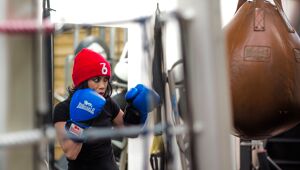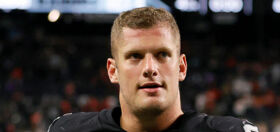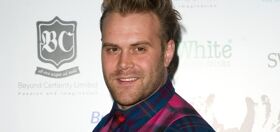
Gina Yashere has arrived. Literally.
The out-lesbian stand-up comic has spent years as a fixture of comedy on both sides of the Atlantic, appearing on shows like The Daily Show and Last Comic Standing talking about her life as a British born woman of Nigerian descent. Almost two years ago, a chance phone call with Chuck Lorre, creator of hit series like Mike & Molly and Two and a Half Men, landed Yashere the most lucrative opportunity in the history of her career: writing, producing, acting in and creating the first American sitcom about a Nigerian family living in the US, Bob Hearts Abishola. The series airs Monday nights on CBS.
Yashere also just walked in the door of her Toluca Lake home as we greet her on the phone; she’s spent all day on set writing and filming her scenes as Kemi, the best friend of the titular Abishola. She has agreed to chat with Queerty about the show, the upcoming season finale, her work as a stand-up comic, and her own multicultural background.
Bob Hearts Abishola airs Monday nights on CBS Mondays 8:30/7:30c. Catch Gina live at Netflix Is A Joke Fest’s STAND OUT: An LGBTQ+ Celebration show on May 1st at the Greek Theatre in Los Angeles.
How about we take this to the next level?
Our newsletter is like a refreshing cocktail (or mocktail) of LGBTQ+ entertainment and pop culture, served up with a side of eye-candy.
How has your life changed since getting the show? Are you getting more offers?
I’m in one place, in that I’m used to stand up. I’ve been on the road for 25 years traveling doing comedy. That has completely come to a stop since this show has taken over my life. I’m in LA and I bought a house near Warner Bros., and I’m there every day. In preproduction, I’m writing from 10am-5pm every day. Then when we’re into production, I’m there writing every day and also shooting. I’ve got four jobs on this show: co-creator, writer, producer and actor. So it’s non-stop.
When do you sleep?
On Sundays.
[Laughter]
How did you get hooked up with Chuck Lorre?
Literally, it was a call. Chuck had an idea that he wanted to do a show with Billy Gardell [who plays Bob] where he plays a man who falls in love with an African immigrant. So they did some research, came up on Nigeria, and wanted to make her Nigerian. But they knew…they needed to find a comedian, preferably a female Nigerian to help write it. So they did a Google search for Nigerian female comedians, and I was one of the few that came up. They watched a set I did talking about Nigerian culture. And they called me to a meeting.
Wow.
I was originally brought in as a consultant. But as I provided more and more help, Chuck wanted me to stay to co-create the show. It was from a meeting that was supposed to last a day or two, and it turned into me staying for two and a half weeks and writing a pilot. CBS picked it up, and the rest is history. I bought the house and ordered all the furniture online in six days.

Photo: Michael Yarish CBS 2019 CBS Broadcasting, Inc. All Rights Reserved
That’s a great Hollywood story. And a crazy one. I gather, in that event, you’re someone who likes a challenge.
I do love a challenge. I moved to America on a whim. Growing up, you guys always had better TV shows.
Well, let me ask you this then. How does the challenge of writing and acting in a show different from stand-up comedy? Which is harder?
For one, a stand-up comedy routine is very solo. It’s me writing by myself for me to perform. So I’ve never been in a writer’s room before. I’ve been offered, but always turned it down. I was a stand-up comic and didn’t want a day job. I didn’t want to write for anybody else.
Sure.
But when this first came up, my temptation was to turn it down. Luckily my brother & my best friend called me and told me what a f*cking idiot I was being.
[Laughter]
So it’s a massive change. At first it was just me, Chuck, Eddie and Al writing the pilot. I was surprised at how quickly I took to it. I’ve been coming up with jokes and writing a long time, so the jokes came easy to me. What I’m learning now is the discipline of writing a script, and that I did not have. I feel like I’m taking a crash course with the best in the business. People would pay millions just to be in the same room with Chuck.
Now having seen the show and your stand up, I was really struck by the parallels and recurring themes. Life as a woman, life as an immigrant, as a person of color, being queer.
Yes.
I was curious to see that Abishola’s main insecurity is living up to her duty as a woman. Is that something you feel personally?
Abisohola’s life and her insecurities and her expectations as a Nigerian woman come from my culture, from my family. So Abishola is kind of based on my mother’s experience: her whole story about ending up in America because her husband couldn’t get work as a civil engineer, and him going back to Africa is basically the story of my parents. My mom was in England. My dad was a lawyer. They studied there. But in England, in the 60s, they didn’t allow black lawyers to practice. So my dad went back to Nigeria to practice law. But my mom said “Our children are British. I want to stay here and give them opportunities.”
Sure.
So all Abishola’s sense of being comes from women in my family of that generation. I’ve kind of broken all of those, but that is from my mum.
So what do the women of your family think about the show and the way it portrays Nigerian women?
They love it. It’s very authentic. When you see Africans on typical TV shows, it’s very generalized. They’re not specific about country, tribe, language. Every country, every tribe has its own traditions. American television has never had the specificity that our show has. So Nigerians are really loving that they can recognize themselves. And Americans, in general, enjoy the show because it’s showing interesting funny people from different backgrounds.
Related: Cyndi Lauper receives special honor from the United Nations for LGBTQ advocacy
When I talk to LGBTQ comics, I’m always curious: how does performing in front of a predominantly queer audience differ from a straight one in your experience?
Well, ok, so as a comedian I didn’t start talking about my sexuality until much, much later in my career. And I mean the last few years. I made a point of not focusing on that. I’m a woman, and I’m black—I already have those two things against me as it were, in this industry. I didn’t want to add another label to that. So I made a point of writing material that wasn’t about my sexuality so I could talk about different subjects. But as a gay comic in front of a gay audience—it’s like being a black comic in front of a black audience. When you talk about things specific to that audience they respond to that knowledge and shared experience. But I’m always aware of being a gay comic using material written for a gay audience. With any audience, I try to be authentically myself, and I talk about all aspects of my life. But, at the same time, you have to read your audience. That’s part of being an entertainer.
Sure. Now you said you worked in comedy before you wanted to talk about your sexuality in your routine. Were you ever advised against talking about being gay or coming out by your agent? Your management?
Oh, I was advised by many people not to do it. Mainly, other black people who were like black audiences are super homophobic.

Photo: Michael Yarish/CBS 2020 CBS Broadcasting, Inc. All Rights Reserved.
Really?
They said I’d lose my audience. But most of the time, it was me. Coming out—I wasn’t sure what to do at that point. I’m black and I’m female. So I needed to overcome those hurdles in this industry. I didn’t want to get pushed into a smaller box.
That makes sense. I’ve also heard it said from other women in comedy—Kathy Griffin, Aisha Tyler, Margaret Cho—that comedy is very much male-driven, and that female comics are often harassed or just treated badly. Is that true for you?
Oh yes and no. I know a lot of female comics feel like they were pushed into being a certain kind of comic. A lot of female comics when I started felt like they weren’t being appreciated, and were almost apologetic on stage. They were pushed into that style of comedy by audiences and because male comics were not accepting. I’ve never been that kind of personality. I’m very forthright. I didn’t give a f*ck. This is me. This is how I am. My style of comedy is quite in your face and aggressive, and it kind of helps in that audiences are like this is a woman not to be f*cked with. That persona helps me in the business in a way to get work because I wasn’t “that” kind of female comic. I was not apologizing for who I am. I’m not trying to be anything that I’m not.
That’s wonderful.
And male comics were just not accepting of female comics. We’d get the sh*tty gigs. We get booked to be the “woman on the floor.” Most of my career, I’ve usually been the only woman. They usually only book one woman like we’re a f*cking novelty act. This is the kind of stuff we had to put up with.
That’s amazing to me. The funniest people I know are women.
That’s it.
So do we know about season two yet?
We don’t know about season two yet, but I’m pretty positive. I’m feeling good. I think we’ve made a really good show, and I think people really like it. I’m feeling good about the possibility.

Photo: Michael Yarish/2019 Warner Bros. Entertainment Inc. All Rights Reserved.
I saw the ratings numbers, and it looks like they’ve actually been going up. That bodes well.
In these times, for a first season show, a show where half the cast is African immigrants, you know what I mean? It’s kind of crazy. But it’s a show about positivity and love and acceptance. I think people need that right now.
So what’s next for you, apart from a potential season two?
Well, I’m actually really enjoying being behind the scenes, writing and producing. I have an idea for a show based on my life, which is where my comedy comes from, about a woman who repairs elevators for a living. That’s what I did before I started comedy. So I have a whole story. I want to produce more shows, but stand-up is my first love. I’m never going to stop doing [comedy] shows. As soon as the show wraps, I’ll be in New York doing the Gotham Comedy Tour. And then I’ll be back on the road.
Bob Hearts Abishola airs Monday nights on CBS Mondays 8:30/7:30c. Catch Gina live at Netflix Is A Joke Fest’s STAND OUT: An LGBTQ+ Celebration show on May 1st at the Greek Theatre in Los Angeles.



















